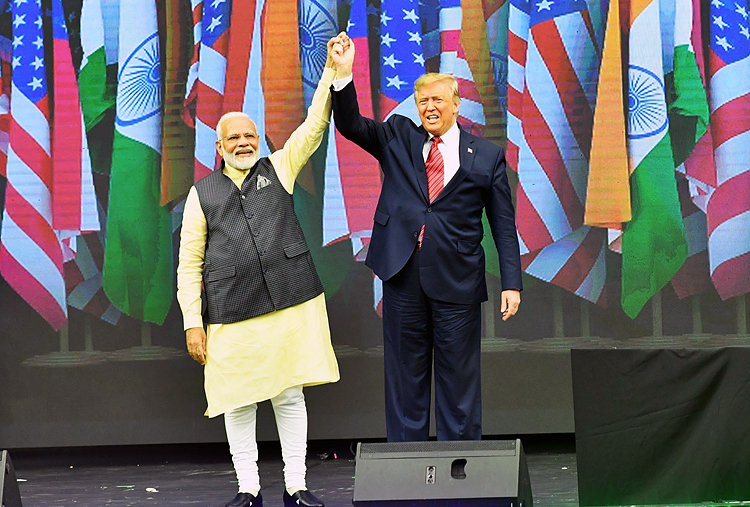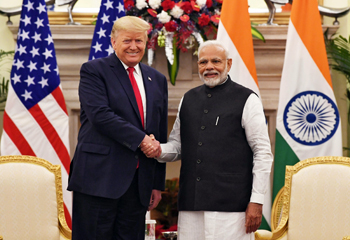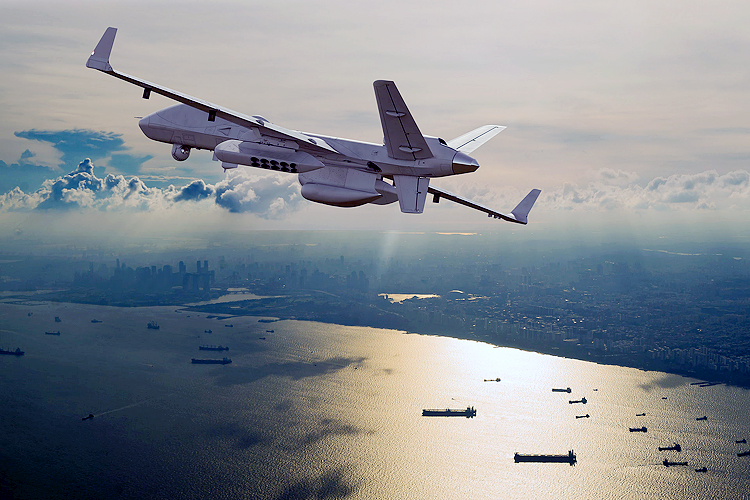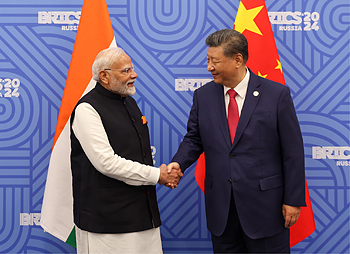INDIAN ARMED FORCES CHIEFS ON OUR RELENTLESS AND FOCUSED PUBLISHING EFFORTS

The insightful articles, inspiring narrations and analytical perspectives presented by the Editorial Team, establish an alluring connect with the reader. My compliments and best wishes to SP Guide Publications.

"Over the past 60 years, the growth of SP Guide Publications has mirrored the rising stature of Indian Navy. Its well-researched and informative magazines on Defence and Aerospace sector have served to shape an educated opinion of our military personnel, policy makers and the public alike. I wish SP's Publication team continued success, fair winds and following seas in all future endeavour!"

Since, its inception in 1964, SP Guide Publications has consistently demonstrated commitment to high-quality journalism in the aerospace and defence sectors, earning a well-deserved reputation as Asia's largest media house in this domain. I wish SP Guide Publications continued success in its pursuit of excellence.
- Indian Air Force Aims for Full Indigenous Inventory by 2047 — Air Chief Marshal A.P. Singh
- Rajnath Singh assumes charge as Defence Minister for the second consecutive term
- Interim Defence Budget 2024-25 — An Analysis
- Union Defence budget 2024
- Prime Minister Modi Flies in the LCA Tejas
- New Chapter in India-Italy Defence Ties
- Airpower beyond Boundaries
Trump's Victory: What will it unfold for India
For India, one of the most significant aspects of Trump's return will be his approach to China. There is a possibility that Trump will continue to view India through a transactional lens, prioritising trade deficits and economic returns. The role which the US plays as the global tech powerhouse is the model for future growth which cuts across economy to security. In all potential, there are mostly positive signs, rather another defining era for Indo-US relations could unfold if indicators are right. The convergence of mutual interest for both democracies is too obvious.

The return of Donald Trump to the White House in 2024 is likely to have far-reaching implications not just for the United States but for its global partners, with India being no exception. As the world's largest democracy, India has cultivated a complex but robust relationship with the US over the past few decades, navigating through geopolitical, economic, and diplomatic shifts. Trump's presidency in 2016-2020 was marked by a series of bold and often unpredictable policy moves, and the possibility of his return raises important questions about how his second term will reshape Indo-US relations.
The return of Donald Trump to the White House could reshape Indo-US relations, presenting both opportunities and challenges for India, especially in areas of trade and strategic collaboration.
In 2025, with Trump back in office, will India have to navigate and balance between greater strategic collaboration but also the risk of further economic friction built on his assertion around trade and tariffs?
Strategic Alliance or Tactical Posturing?
One of the most significant legacies of Trump's first term was strengthening the US-India strategic partnership. Under his leadership, the US and India moved closer, particularly in the areas of defence, counterterrorism, and trade. Trump's administration voiced strong support for India's territorial integrity, especially concerning Pakistan, while recognising India as a key counterweight to China in the Indo-Pacific region. This alignment with India's broader regional and global aspirations signalled a partnership that went beyond traditional diplomatic niceties.
Trump's first term strengthened the US-India strategic partnership, particularly in defence, counterterrorism, and as a counterweight to China, but his "America First" policy also introduced economic unpredictability

Trump's "America First" foreign policy was equally marked by unpredictability and occasional erraticism. India benefitted from his assertive stance against China, but Trump's transactional approach to diplomacy left many of India's long-term goals in a state of uncertainty. The trade tariffs and the US pullback from multilateral agreements, such as the Paris Climate Agreement, left India grappling with a world order that was being rapidly redefined.
There is a possibility that Trump will continue to view India through a transactional lens, prioritising trade deficits and economic returns. While this may mean short-term economic gains for India—particularly in defence contracts and trade—India will also have to be cautious about the broader implications of this transactional approach for long-term diplomacy.
However, there are already assuring messages as External Affairs Minister S. Jaishankar said, "The India-US relationship is a train on steady tracks, no matter who takes the White House." In a joint press briefing in Australia with his counterpart Penny Wong, Jaishankar emphatically stated that the India-US bond has not only survived but thrived through five different presidencies. "Our relationship with the United States will only grow, regardless of the election outcome," he remarked.
Economic realignment, advanced tech collaboration
In Trump's first term, his administration imposed tariffs on Indian goods, and despite the growing defence and security ties, trade relations remained a contentious issue. Trump's focus on narrowing trade deficits meant that India often found itself at odds with the US over issues like market access, intellectual property rights, and data localisation.
With his re-election, India may once again find itself under pressure to resolve trade issues in a manner that favours US economic interests. Given the economic strain caused by the pandemic and the global shifts in supply chains, India's trade surplus with the US could become a key bravado, particularly as the US pushes for greater market access and trading practices.
India must maintain a balanced foreign policy, strengthening regional ties and multilateral relationships, even as it leverages the opportunities in a potentially intensified partnership with the US.
However, the most critical is the advancement that has taken place in the bilateral space of India-US relations. The economic relationship between the two countries has diversified beyond traditional industries.
In the last five years, the scope of trade has transcended from traditional trade and commerce to the higher realm of critical and emerging technology, which is definitive to the new era of economic growth based on areas like semiconductors and sensors.
In defence, the partnership has indeed moved up a higher value chain like the acquisition of strategic drones from the US like MQ-9B which is worth over $4 billion. So far, as per an estimate, it will raise the total value of US defence contracts with India to over $25 billion since 2007.

Additionally, in the greater military-strategic sphere, India signed a $716 million contract in 2021 for the supply of 99 F404 engines for LCA Tejas, and further, a partnership for newer F414 engines for the forthcoming Tejas Mk2 for the joint production of the jet engines in India.
With the rise of India's tech sector, pharmaceuticals, and digital services, India's role in the global supply chain has become increasingly crucial. India's economic resilience and growth, paired with Trump's strong inclination towards American businesses, could rather lead to new opportunities in areas like healthcare, technology, and defence manufacturing, but only if trade tensions are managed carefully.
In fact, frictions, if any on trade, tariffs, and domestic political issues on immigration, there will be greater gains and benefits to India from the ongoing supply chain shifts, as de-risking from China gathers momentum under a Trump presidency according to a global research agency, Nomura.
With this, India is also well-prepared to handle any volatility stemming from US policies, amid its large forex reserves buffer, continuing growing economy, robust fiscal discipline and market reforms.
A renewed US-India partnership under Trump would likely benefit from his confrontational stance on China, aligning with India's strategic concerns, though it risks regional instability due to his unpredictable policy decisions.
The China Factor: A Double-Edged Sword

For India, one of the most significant aspects of Trump's return will be his approach to China. The Trump administration took a hawkish stance against China, engaging in a trade war, imposing tariffs, and taking a hard line on issues like the South China Sea and Taiwan. This approach aligned with India's strategic interests, particularly as India found itself locked in an ongoing border standoff with China in the Himalayas.
Trump's vocal criticism of China and his administration's efforts to build stronger alliances with Indo-Pacific nations were welcomed by India, especially as the geopolitical rivalry between India and China intensified. In this sense, Trump's return may offer a continued strategic advantage for India, especially if he maintains his confrontational stance on China.
However, there are risks. Trump's foreign policy has often been defined by volatility, and his tendency to take unpredictable, unilateral actions—such as pulling out of international agreements or imposing sanctions—could destabilise the region and disrupt India's diplomatic initiatives. A sudden shift in US policy, or an overemphasis on bilateral trade with China, could place India in a difficult position, especially given its complex trade relationship with China.
Also, it is important that we take into account the shifting investment and manufacturing base in India and the ASEAN is largely from the US, Europe, and key Asian economies (Japan and Korea). In such a situation, these are the offsets for India in case of any radical policy change or embargo on the third countries.
A Political Gamble
Trump's return to power is also likely to have domestic political consequences for India. The US president's rhetoric—often confrontational and divisive—can be a double-edged sword for Indian leadership. Modi-Trump camaraderie during Trump's first term was largely seen as an alignment of leadership, with shared visions of nationalism and protectionism. However, the optics of a Trump victory could also be polarising, both domestically and internationally.

India's leaders will have to carefully calibrate their public diplomacy, emphasising the benefits of the US-India partnership while managing any potential fallout from Trump's more controversial positions. A potential shift in US immigration policies or visa restrictions could further complicate matters, especially for India's large diaspora in the US.
Navigating a Complex Future
India's relationship with the United States under a second Trump term is likely to be shaped by a combination of continuity and uncertainty. While India stands to benefit from a continued strategic alliance with the US, particularly in countering China, the transactional nature of Trump's diplomacy means that India will have to be agile in managing economic and trade concerns. Additionally, India must navigate the global and domestic ramifications of Trump's rhetoric and political style, which could both help and hinder the bilateral relationship.
In this new geopolitical environment, India must continue to assert its interests, pursuing a balanced foreign policy that is not overly reliant on any single power but of course, a greater alignment with the US is certainly an advantage to India. The role which the US plays as the global tech powerhouse is the model for future growth which cuts across economy to security. In all potential, there are mostly positive signs, rather another defining era for Indo-US relations could unfold if indicators are right. The convergence of mutual interest for both democracies is too obvious.
India's long-term objectives should remain focused on strengthening its regional leadership, enhancing multilateral ties, and investing in the emerging global order, even as it collaborates with the Trump administration on shared challenges and opportunities.
Manish Kumar Jha is a Consulting & Contributing Editor for SP's Aviation, SP's Land Forces and SP's Naval Forces and a security expert. He writes on national security, military technology, strategic affairs & policies.





